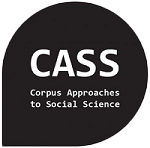-
Introductory Blog – Emma Putland
My name is Emma Putland and I’m really excited to have recently joined the team here at CASS. More specifically, I’m the Senior Research Associate on the UKRI-funded Public Discourses of Dementia Project, led by Dr Gavin Brookes. This project recognises the important role that language and imagery play in perpetuating, but also resisting, stigmatising…
-
William Dance – Introductory Blog
My name is William Dance and I’m one of two new Senior Research Associates in CASS. I’m currently finishing my PhD in the linguistics department here and my main research interests are corpus approaches to deception and manipulation, using methods like (critical) discourse analysis to study online disinformation (better known as ‘fake news’). I’m working…
-
Tara Coltman-Patel – Introductory Blog
My name is Tara Coltman-Patel and I am so excited to be a new member of CASS. I am working as one of the Senior Research Associates on the ESRC-funded Quo VaDis project: Questioning Vaccination Discourse: A Corpus-Based Study project, which explores discussions about vaccinations in UK parliamentary debates, UK national newspapers and on the…
-
The anatomy of a troll
My research focuses on online aggression, deception, and manipulation. For the past few years I’ve focussed quite closely on the behaviour known as “trolling” (though notably now this term is being used to refer to an increasing scope of behaviours that could be more accurately termed cyberbullying, cyberharassment, and cyberstalking). My plans with regards to…
-
Acquisition of Mandarin Chinese as a foreign language
The British Academy has awarded Lancaster University a three-year grant under its International Partnership and Mobility Scheme (IPM 2013). The research partner in the joint project is Guangdong University of Foreign Studies (GDUFS) in China. The project is entitled “The corpus-based approach to the acquisition of Mandarin Chinese as a foreign language”, which aims to…
-
Corporate Financial Information Environment (CFIE)
The UK financial sector is a major driver of economic activity and transparent and effective financial communication is a key determinant of its success. Audited financial statements, unaudited corporate disclosures, and information signalled through corporate financial choices are the primary ways that firms communicate with capital market participants. These mechanisms, together with information from analysts,…
-
Facilitating Critical Discourse Analysis of Contemporary China
This department R&D project aims to build a large corpus of Chinese news text designed to facilitate diachronic critical discourse analysis of social changes in contemporary China, helping to enhance the department’s already-strong reputation in corpus-based CDA by extending it to a language and culture other than English and the West. The resulting corpus will…
-
Metaphor in End-of-Life Care
This ESRC-funded project is a corpus-based study of the metaphors used to talk about end-of-life care by patients nearing the end of life, unpaid family carers and health professionals. We study interviews and online forum data in order to investigate how metaphors may help or hinder successful communication between members of these different groups. We…
Search A Keyword
CASS Briefings

CASS: Briefings is a series of short, quick reads on the work being done at the ESRC/CASS research centre at Lancaster University, UK.
Recent Post
Tags
amanda potts brazil claire hardaker elena semino islam Islamophobia learner language metaphor metaphor in end of life care paul baker spoken BNC2014 tony mcenery Trinity Lancaster Spoken Learner Corpus trolling twitter
Categories
- Ambassadors
- Anatomy of a troll
- Applications of corpus linguistics
- Big data media analysis and the representation of urban violence in Brazil
- Blogs
- BNC2014
- Call for Papers
- CASS Affiliated Projects
- CASS Briefing
- CFIE
- Challenge Panel
- Changing Climates
- Comparable and Parallel Corpus Approaches to the Third Code
- Distressed Communities
- DOOM
- Events
- General
- Hate Speech
- Healthcare
- iCourts
- Jobs
- L2 language corpora
- Lancs Box
- learner corpora
- MA in Corpus linguistics
- Maritime Security and Piracy Discourses
- Media
- MELC
- MOOC
- News
- Newspapers
- Newspapers poverty and long-term change
- Post Event Summaries
- Research
- Spatial Humanities
- Spoken BNC2014
- Trinity
- Uncategorized
- Understanding Corporate Communications
- Urban violence
